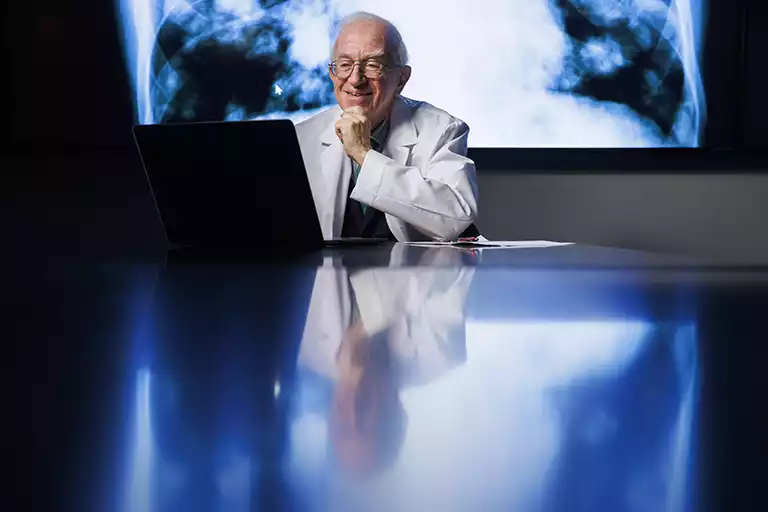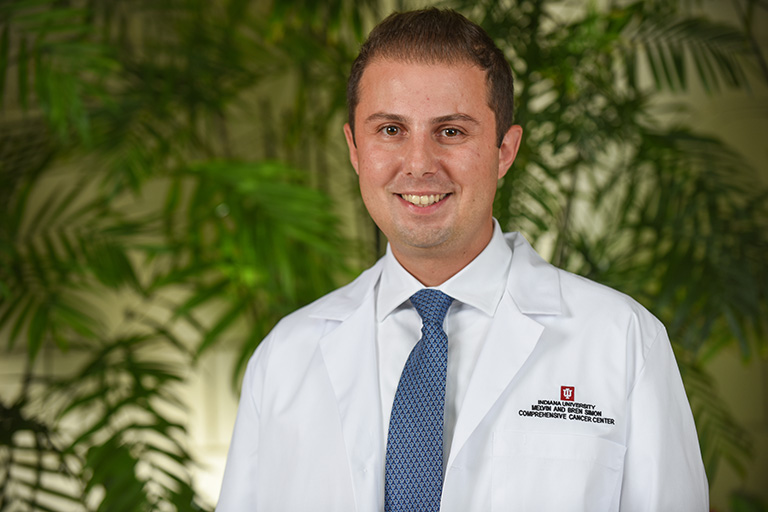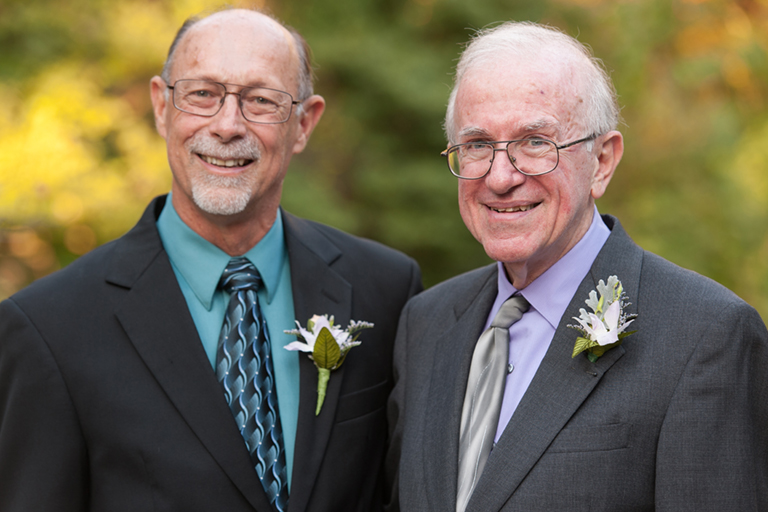A diagnosis of testicular cancer was once almost akin to a death sentence. Over the past 50 years, that’s dramatically changed. The chemotherapy regimen developed by Larry Einhorn, MD, has lifted the cure rate to almost 95%. Though that’s impressive, Einhorn and his colleagues at Indiana University are not satisfied and continue a robust research program focused on resistant or recurrent disease and lessening the long-term side effects of treatment.
Testis Cancer Research Update

Each year, about 8,000 men are diagnosed with testicular cancer. Often, they make their way to Indiana University Melvin and Bren Simon Comprehensive Cancer Center, one of the few places in the world with the expertise and resources to fundamentally alter outcomes. For those men who cannot travel to IU, Einhorn and his team continue to consult directly with patients and their physicians—at no charge—to ensure they are getting the best possible care wherever they are.
Our research does more than help cure those who turn to us–it changes the standard of care for patients worldwide. With your philanthropic support, we can continue to provide this level of expertise for years to come.
Marking 50 Years of the Cure
In 2024, IU marked the 50th anniversary of Einhorn’s groundbreaking discovery. Over the past 50 years, his chemotherapy regimen to treat testicular cancer has saved hundreds of thousands of lives and is widely considered among the greatest achievements in medicine.
“Even in my wildest youthful exuberance, I never dreamed that this type of therapy would have that type of result,” Einhorn said. “It's the Neil Armstrong walk on the moon. You do something like that once in your professional career.”
The magnitude of Einhorn’s discovery is quantifiable not only in the hundreds of thousands of lives saved but also through the ripple effect on dozens of oncologists he has trained and a lasting culture of exceptional research and care at the IU Simon Comprehensive Cancer Center.
Treatment Resistant Disease
Unfortunately, there are still patients who are not cured by standard or intensive high-dose chemotherapy. Their cancer continues to spread even in the face of intensive treatments.

Several years ago, IU researchers conducted genomic testing on these patients. The results showed that their cancers often overexpress a certain protein that drives tumor growth. IU researchers immediately began to search for a way to block it.
In Spring 2021, Nabil Adra, MD, launched a clinical trial for a drug he hopes will do just that. The initial plan was to enroll 25 patients, but given early results, the trial was expanded to enroll up to 50 patients from across the country who will take a single pill orally each day. While it is still early, researchers are optimistic.
Unlike chemotherapy, this drug is a targeted therapy. It spares patients from the draining physical toll that comes with a cisplatin-based protocol. Additionally, patients can stay on the drug, which was initially developed for kidney cancer, if needed. This clinical trial is nearing completing enrollment and the IU team hopes to share results in the near future.
Investigators are also opening a clinical trial at IU looking at a novel immunotherapy approach to treat patients with refractory—or treatment resistant—testicular cancer. This novel treatment guides our immune system to identify the foreign testicular cancer cells and fight them. Researchers are excited about this promising trial and the possibility of a new approach to treating patients.
The IU team is also opening a clinical trial evaluating CAR-T cell therapy in patients with testicular cancer who are not cured with standard regimens. CAR-T is a novel form of immunotherapy where the immune system is harnessed to fight cancer cells.
Relapsed Disease
Almost 80 percent of men treated with Einhorn’s chemotherapy regimen are cured after their first round of treatments. Unfortunately, some see their testicular cancer return.
At Indiana University, the standard protocol for patients with relapsed disease is high-dose chemotherapy and a stem-cell transplant. Studies over the past 20 years have shown that this approach will cure about 60 percent of these patients.
However, Einhorn and his protégé, Nabil Adra, MD, are looking for ways to boost that cure rate.
IU is conducting a clinical trial that gives one group of patients the time-tested therapy followed by observation. Another group receives intensive high-dose chemotherapy followed by a chemotherapy drug in pill form for three months as a maintenance therapy. The goal is to understand if this maintenance therapy improves the cure rate compared to men who receive high-dose chemotherapy alone.
This research is being funded by philanthropic support from donors like you. In many other cancers, pharmaceutical companies are more likely to invest in such trials. That is not the case for a rare disease like testicular cancer, making donor support crucial for researchers to explore ways to advance treatment.
Patients with testicular cancer who have relapsed disease spread to the brain are particularly difficult to cure. Research led by Jennifer King, MD, showed that these patients can be cured with high-dose chemotherapy and stem-cell transplant. This was presented at the American Society of Clinical Oncology Annual Meeting in June 2024.
Biomarkers
The longer cancer goes undetected—and untreated—the more challenging it can be to eliminate. Even when treatment is successful, oncologists need a tool to easily monitor whether the disease is returning.
Available blood tests are only about 60 percent accurate. However, researchers have identified new potential biomarkers that hold promise. When heavy amounts are circulating in a patient’s bloodstream, it is evidence that a tumor is present.
IU researchers are developing and optimizing blood tests for these biomarkers, a minimally invasive way for physicians to detect microscopic amounts of testicular cancer. So far, data indicates it is roughly 90 percent accurate.
Now, scientists are working to clarify how best to interpret the results of this new blood test. For example, a patient with localized disease often undergoes surgery or chemotherapy to prevent cancer from recurring.
A highly accurate diagnostic test would help us know whether additional procedures such as surgery or chemotherapy are truly required–or whether a patient should be followed with close observation alone.
IU researchers – led by post-doctoral research fellow Rebecca Hassoun, MD – presented a multi-institutional collaboration evaluating circulating tumor DNA – a novel biomarker that detects tumor DNA in the blood – at the American Society of Clinical Oncology Annual Meeting conference in June 2024.
Given the positive findings of the study, investigators are hoping to secure funding for a new trial for a larger number of patients so they can expand their dataset and further validate their findings.
Survivorship
For most patients, a combination of cisplatin and two other chemotherapy drugs eradicates their disease. Unfortunately, these drugs also have lasting side effects that, for some survivors, can disrupt daily life.

Lois Travis, MD, ScD, oversees work aimed at reducing or eliminating those side effects. Travis is an internationally recognized expert in survivorship and leads the Platinum Study. This global consortium is working to predict who is susceptible to toxicities from cisplatin and protect patients from side effects. Their findings will impact nearly 6 million people treated with platinum-based drugs worldwide.
The group linked hearing loss in some patients to the total dose of cisplatin they received. Others have a genetic variant that makes them susceptible to neuropathy. This information is invaluable and can help oncologists determine which patients might be most at risk and alter treatments accordingly.
The insights uncovered through this research will allow survivors to enjoy all life offers—to forge ahead in their careers, watch their children grow, and enjoy intimacy with their partners.
Travis and her research collaborators published a new study this year that followed a cohort of testicular cancer survivors who received cisplatin-based chemotherapy. Researchers followed the Platinum Study patients for a median of 14 years and found that that 78% experience significant difficulties in everyday listening situations, negatively impacting their quality of life. This collaborative research is the first to measure real-world listening challenges and hearing loss progression in cancer survivors over a long period of time.
“It will be critically important to follow these patients for life,” Travis said. “Their current median age is only 48 years, and eventually they will enter the years at which age-related hearing loss also begins to develop.”
Honoring John Cleland
A 47-year cancer survivor, John Cleland was the first person successfully treated for testicular cancer, thanks to Einhorn’s discovery. He died at age 71 in 2022. The John Cleland Fellowship in Testis Cancer Research was established to honor his legacy and encourage ongoing testis cancer research conducted by IU oncology trainees.

The inaugural Cleland Fellow Noah Richardson, MD, immediately got to work to make an impact. Working alongside Dr. Einhorn and others, he authored a study focused on men who had late relapses of their germ cell cancers. Relapses are rare recurrences of testicular cancer more than two years after completion of initial therapy.
While testicular cancer is highly curable with chemotherapy when first diagnosed—and even in early relapse with further chemotherapy—men whose cancer return in the late relapse period have a low chance of cure with chemotherapy alone. Research showed that surgery continues to be the best treatment option to achieve a cure. Additionally, a simple blood test can identify some late relapses. This study reinforces the critical need for testis cancer survivors to continue annual follow-ups beyond the five-year mark to hopefully detect these relapses earlier when surgery could still be an option for curing these men.
Now Richardson has signed on to become an IU faculty member following the completion of his fellowship training in August 2025. Your generosity has nurtured this promising young researcher and contributed to his success. Thank you for helping IU retain a brilliant and compassionate physician scientist.
Support the Future of Testis Cancer Research
Philanthropy maximizes IU Simon Comprehensive Cancer Center’s push to develop new therapies and answer questions that save lives.
For other ways to support testicular cancer research, contact Amber Kleopfer Senseny at 317-278-4510 or akleopfe@iu.edu.




